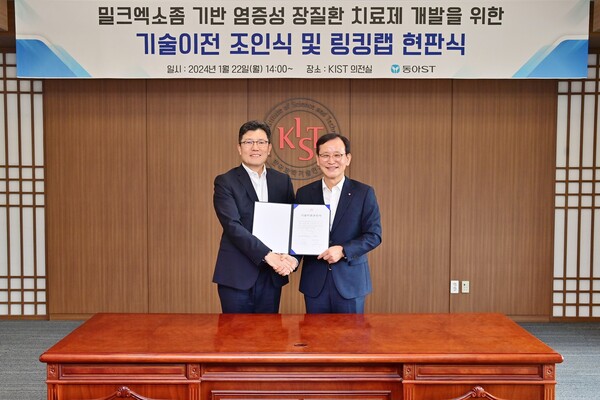Dong-A ST said it has partnered with the Korea Institute of Science and Technology (KIST) to develop a novel treatment for inflammatory bowel disease (IBD).

Under the accord, Dong-A ST will acquire the patent rights for the oral nucleic acid therapy delivery technology developed by KIST's Biomedical Material Research Center. This technology leverages milk exosomes, a type of extracellular vesicle naturally secreted by cells, to deliver therapeutic materials directly to disease sites, minimizing side effects and enhancing safety.
Milk exosomes are derived from dairy and offer several advantages over exosomes from animal cells, including higher productivity and the possibility of oral intake. They are especially promising for IBD treatment as they can be directly delivered to the gastrointestinal tract, potentially reducing side effects and leveraging the long history of safe milk consumption.
IBD, which includes Crohn's disease and ulcerative colitis, is characterized by an excessive immune response in the digestive tract. Current treatments often involve lifelong administration of TNF-alpha inhibitors through injections, which can lead to patient fatigue and potential side effects or resistance within two to five years.
The two parties will also engage in a two-year joint research project, selected by KIST's Linking Lab initiative, to commercialize the milk exosome technology.
KIST will focus on the early stages of therapy loading techniques and manufacturing processes for milk exosomes, as well as validating their efficacy in animal models for treating IBD.
Dong-A ST plans to scale up these processes, investigate the mechanisms of the therapeutic effects, and advance the development of the treatment as the company also believes the potential of milk exosomes as a delivery system could also lead to the development of a platform for a range of treatments for various diseases.
"The milk exosome-based oral nucleic acid therapy developed through our joint research with Dong-A ST could be a revolutionary drug that improves human life beyond Korea's borders," KIST President Yoon Seok-jin said.
Dong-A ST President of Research and Development Park Jae-hong also said, "Focusing on the unique properties of milk exosomes, we recognized the potential for developing treatments for high unmet medical needs like IBD."
The company plans to expand this platform to develop treatments for a variety of diseases, Park added.
Related articles
- Dong-A ST and Eleven Therapeutics collaborate on gene therapy
- Dong-A ST completes BLA filing with FDA for Stelara biosimilar
- Dong-A ST licenses in SK biopharmaceuticals epilepsy drug to market in 30 countries
- Dong-A ST launches combination drug for type 2 diabetes
- IMBiologics partners with Dong-A ST for novel antibody drug development
- Dong-A ST and Yuyu Pharma to co-market peripheral circulation improvement drug Tanamin

